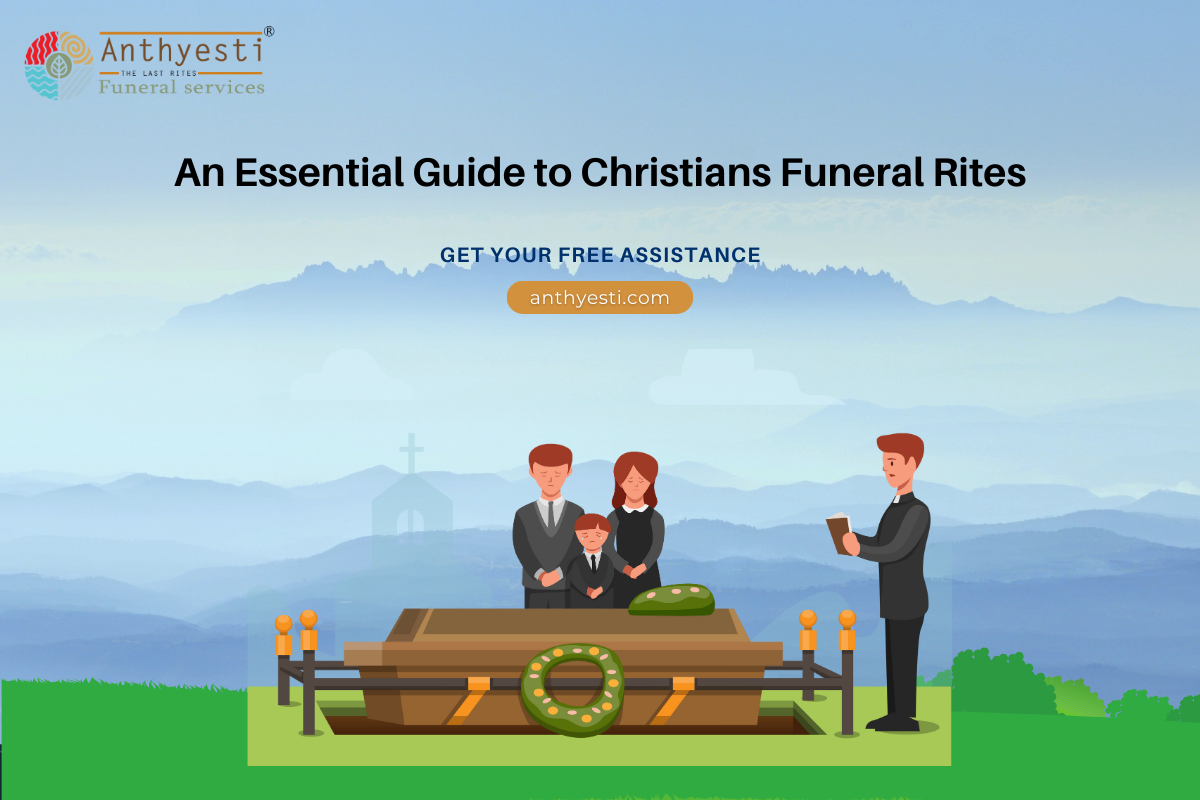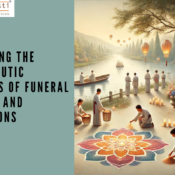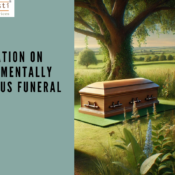
An Essential Guide to Christians Funeral Rites
Christian funeral services take place in the church, offering friends and family a chance to mourn and pray for their loved one. Anthyesti Funeral Services focus death and mourning in Christianity focus on the afterlife and heaven, meaning the funeral service is an important time to reflect on faith and mortality. The traditional, familiar customs of a Christian funeral rites also bring comfort during a difficult time. Different denominations of Christianity have their own variations on the traditions, and you can also individualize your funeral service to create a ceremony that feels personal while honoring your faith.
Christian funeral traditions
There are many different branches of Christianity, and funeral customs and etiquette vary between each. However, there are some Christian funeral traditions that are common among most denominations.
- Wake: Several branches of Christianity hold a wake after someone passes away. This takes place before the funeral and can be held at the church, the funeral home, or the family’s home. It’s less formal than the funeral ceremony, giving friends and family a chance to chat with and support one another. Food is often served. There are prayers, readings, and eulogies as well.
- Viewing or visitation: While the body may be present at the wake, a viewing or visitation specifically gives loved ones a chance to visit the body and is customary in many denominations. While a wake always takes place before the funeral, the visitation can happen after the ceremony, before burial, or cremation.
Funeral service
Christian funerals take place in a church. While the exact order and features of the service vary depending on denomination, a Christian service generally includes the following elements:
- Casket: The body of the person who has passed away is present at the ceremony, in a casket. If the person has been cremated, then the urn is present instead. The casket or urn is either carried into the church at the start of the ceremony or placed at the altar before the ceremony begins.
- Opening statement: The pastor delivers an opening statement welcoming attendees, offers words of support for the family, and leads an initial prayer to start the ceremony.
- Prayers, sermons, and hymns: Throughout the ceremony, a range of prayers, hymns, and sermons is led by the pastor. The congregation is often encouraged to sing along with the hymns.
- Readings and speeches: Friends and family may share readings and speeches during the ceremony. For example, they might read a eulogy or say a few words about the person who has passed away. In some cases, for example, at a traditional Catholic funeral, only the priest delivers the sermons and readings.
- Closing words: To end the ceremony, the pastor shares a benediction, offering some words of comfort for the bereaved or a reminder about the importance of living a good Christian life and serving God.
- Burial or cremation: A burial or cremation ceremony follows the funeral service, often on the same day. The pastor says a few words at the burial or cremation site as people gather to watch the casket being lowered into the ground or sent for cremation.
Christian funeral etiquette
There are certain standard practices and etiquette surrounding Christian funerals. If you’re attending a Christian funeral, it’s good to know what to expect. It can be helpful to know about etiquette when planning your own Christian funeral, as well.
What do you bring to a Christian funeral?
Guests don’t need to bring anything to the ceremony itself, but people often arrange in advance for flowers to be sent to the church or funeral home. Sending a card to the family to express your sympathies is appreciated as well. As it’s an emotional event, people often bring along tissues or a hankie.
What do you do at a Christian funeral?
Christian funerals are often formal and somber. The congregation is expected to remain quiet during the ceremony, except during hymns, or if invited to say “amen” after a prayer. The wake is less formal and offers an opportunity to mingle and chat.
What is the dress code for Christian funerals?
Christian funeral etiquette dictates that attendees wear dark colors including black, navy, or brown. During church ceremonies, people should dress modestly, with shoulders and knees covered, as a sign of respect.
How long does a Christian funeral last?
The church service at a Christian funeral lasts around 30 minutes to 1 hour. Often the burial or cremation will take place directly after, and this can be followed by a reception where guests share food and drink together. As a result, some Christian funerals can be all-day events.
Christian burial customs
If you’ve chosen to be buried, it’s customary in Christianity for friends and family to gather around the gravesite at the cemetery for a burial ceremony. The pastor leads the ceremony, reading prayers and often Bible passages as well. In many denominations, it’s traditional for family members to step forward and throw a handful of earth onto the casket once it has been lowered into the ground. Traditionally, the pastor will end the ceremony with the words, “We therefore commit the body to the ground; earth to earth, ashes to ashes, dust to dust; in the sure and certain hope of the Resurrection to eternal life.”
Does Christianity approve of cremation?
Today, many people opt for cremation over burial, for a range of reasons. Cremation is acceptable in most branches of Christianity, including Baptist, Lutheran, and Methodist. These denominations state that there is nothing in the Bible to condemn cremation, therefore the decision between burial and cremation can be left to personal choice.
Although cremation is permitted in Christianity, burial is more traditional. Some branches, for example, Presbyterians don’t support cremation even though it’s not expressly condemned in the Bible, and urge people to choose burial.
In Catholicism, cremation traditionally hasn’t been allowed, as Catholics believe that the body will be resurrected on judgment day. However, cremation is now permitted in Catholicism, as long as the ashes are kept together at a dedicated memorial site. Read more about cremation and Catholicism.
Honoring your faith in the afterlife
If you’d like to plan a traditional Christian funeral, speak to the pastor at your chosen church or to a funeral home to start making arrangements. If you’d like to incorporate some Christian funeral traditions without a full church ceremony, check out these 6 popular funeral alternatives and think about how you could incorporate some religious elements.
Conclusion:
Christian funeral traditions, rooted in faith and respect for the departed, provide a meaningful framework for bidding farewell. The Anthyesti Funeral Service seamlessly integrates with these traditions, acknowledging the cultural and spiritual practices associated with Christian funerals. As Christians navigate the solemn journey of honoring their loved ones, Anthyesti stands as a supportive ally, ensuring a dignified and heartfelt farewell. Whether adhering to traditional customs or exploring alternative ceremonies, Anthyesti Funeral Service remains dedicated to facilitating a seamless process, embracing cultural sensitivity and spiritual understanding. In times of grief, Anthyesti Funeral Service becomes a guiding presence, offering solace and compassion, creating a tribute that resonates with the departed’s faith and provides comfort to grieving families.
Contact us 9883318181
All Categories
- Ambulance (6)
- Anthyesti Biopic Cinema (11)
- Blogs (330)
- Condolences (8)
- Cremation Center (10)
- Cremation Service (58)
- Dead Body Carrier (20)
- Dead Body Freezer Box (49)
- Dead Body Transport (132)
- dead body van (3)
- Death Ceremony (8)
- FAQ (18)
- Freezer box (20)
- Funeral Communities (10)
- Funeral Service (53)
- General (5)
- hearse van service (48)
- Last Rites Pujas (2)
- Last Rites Rituals (10)
- Media Mentions (9)
- Pind Daan (1)
- Pitru Paksha (3)
- Pre Planning Funeral (11)
- Priest Funeral Service (1)
- Shraadh Rituals (3)
- Uncategorized (3)
- Vaikunta Samaradhane rituals (1)
- We are in News (19)





